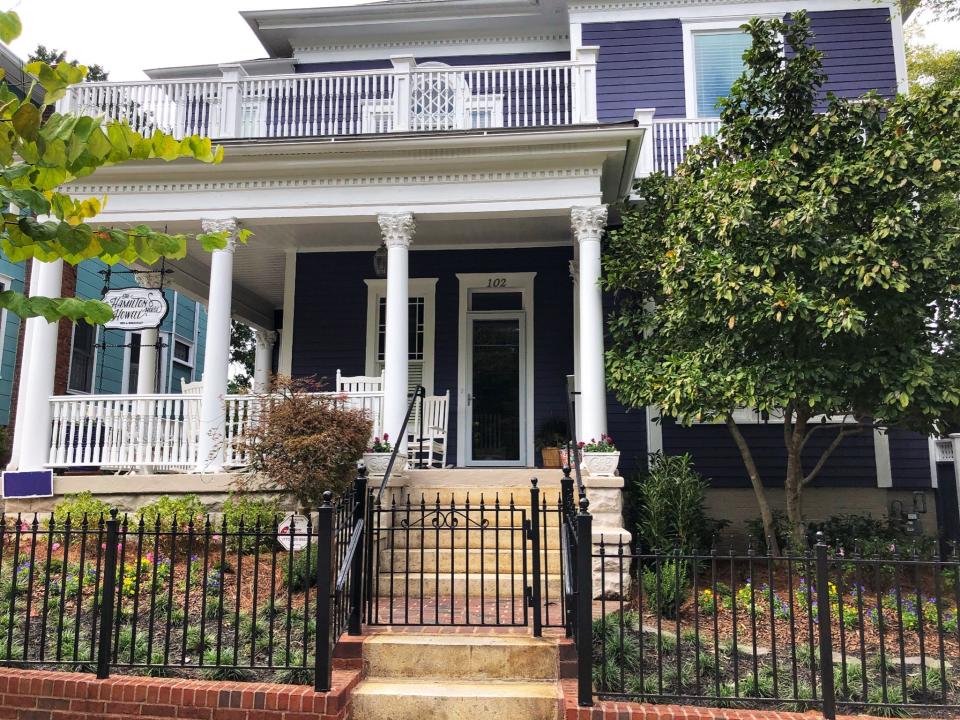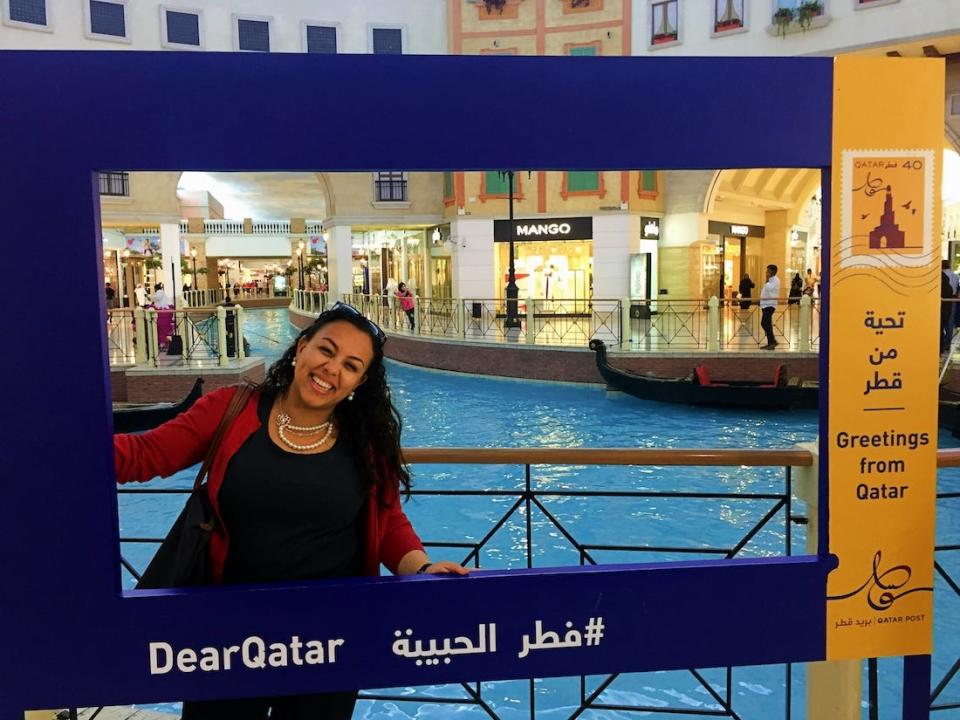'I just want to see more of us': The importance of seeing people like you while traveling
Vanessa Fondeur-Adams is always on the lookout when she travels.
"I always try to have my ears wide open to see if I hear Spanish or if I hear an accent," said the Dominican American founder of Latino World Travelers, an online community with more than 5,000 members. "Most of the time, I don't find anyone ... nobody Latino at all."
Sally Elbassir knows what that's like as a food and travel content creator with Egyptian and Sudanese roots.
"In my travels, I have been so surprised to find how little people know about Islam, but also sometimes I'll be one of the first, if not the first Muslim person they've encountered," she said.
Whether it's a sense of security or a feeling of belonging, travelers who are part of underrepresented groups may look for familiarity in foreign places but discover much more embracing their identities when they travel.
PLUS-SIZE TRAVEL: Travelers of size share struggles, show strength
HIKING HASN'T ALWAYS BEEN ACCESSIBLE: These groups are opening up the outdoors
Searching for a safe place to travel
"I feel like a lot of Black travelers, they’ll reach out to me and they'll say, ‘Which countries are safest for Black people to travel to?’” said Jessica Nabongo, a travel writer and photographer, whose blog and upcoming book are called "The Catch Me If You Can." "I hate this question because I hate that the world we live in has made people feel like they can't go anywhere they want to go; they have to check their safety.
“I always say, ‘You can go anywhere you want to go,’” she said, having done so herself.
Nabongo is the first Black woman documented to have visited every country in the world.
"The most issues I have around racism are in the United States," she said. "In Miami, a cop pulled a gun on me because he thought I was breaking into my friend's house. That just won't happen to me in other countries."

"People feel like it's safe (here) in comparison to other countries, but that's not really the reality," Elbassir said. "I think there's just a sense of familiarity that makes people feel like they're safer."
Mtamanika Youngblood, owner of the Hamilton Howell House bed and breakfast in Atlanta, said "context is everything" when it comes to feeling safe while traveling, especially for Black travelers.
"Where you are, how comfortable you feel, how well you can relate to your environment – all that matters to people, and certainly to African Americans because there's a lot of hostility … in lots of spaces in our history," she said.

Though Youngblood's bed and breakfast "attracts all kinds of people," she said it's important that African American travelers feel "safe and at home" during their stay. The building was constructed in 1890 by African American architect and builder Alexander Hamilton Jr. as his family home. Each room in the house is named after Black icons, including Aretha Franklin, W.E.B. Du Bois and Maya Angelou.
"It's an interesting opportunity, we think, to expose the broader community to Black history and Black culture," Youngblood said. "There's a lot to be proud of, and a lot of history there that we want to expose as many people as we can because we think that's important."
SUN, SAND AND CIVIL RIGHTS: Uncovering Black history at the beach and beyond
'People are just really curious'
Elbassir, who writes about her travels in her blog, Passport and Plates, said it's easy to think of the worst-case scenarios while traveling.
“It's so easy to go in with this kind of fearful mindset, like ‘What if I get robbed, and what if somebody treats me poorly because I'm from a different country or I'm a person of color?’” she said. "What I found in every single country, every continent that I've been to is people are just really curious."

Elbassir welcomes questions when people ask her about her faith after learning she doesn't drink alcohol or eat pork.
"I would rather be able to answer your questions than for you to continue to have maybe a stereotype in your head," she said.
Michael Lindsay said part of the beauty of travel is seeing how much people have in common, no matter where they're from.
"We're just all humans, and we're all going about our daily lives," he said.

He and his husband, Matthew Schueller, share their lives and travels with hundreds of thousands of followers on social media, where they are simply known as Michael and Matt.
"We share because we want others to know ... that we're open about our identities, that we're proud of who we are, and we can travel to these places and be safe and comfortable," Schueller said. "More gay people see it, and they say, 'Hey, I can do that,' and they feel empowered, which I think is super important."
Though there may be a few places they would avoid, such as countries that criminalize same-sex relationships, Lindsay said, "There are so many spaces that no matter who you are, how you identify, that you can feel safe."

Gregg Kaminsky, co-founder of R Family Vacations – a company that plans travel for LGBTQ families and their friends – said destinations have become more welcoming over the years.
Kaminsky credited the growing number of LBGTQ travelers and their spending dollars.
A survey released in 2021 by the International LGBTQ+ Travel Association found 80% of roughly 6,300 LGBTQ people around the globe had passports, and 73% planned to take a major vacation before the end of the year.
"There are places where maybe public displays of affection wouldn't be appropriate when you're out on the street, and it's not necessarily that we're not welcome there," Kaminsky said. "You just have to be aware of local laws and also local customs."
'I still kind of panic a bit': What transgender travelers want other travelers to know
Sherry Abedi, area general manager of Hotel Zena in Washington, noted that the travel industry can do better.
"At the core of travel, you would expect for it to be all about diversity and inclusion, right?" Abedi asked. "When I travel, my intention and my excitement about traveling has to do with learning about other parts of the world, about cultures, meeting people, having access to experience and things that I wouldn't necessarily get in my day-to-day life and where I am. But with saying that, I know that there's room for improvement in our industry and beyond."

Hotel Zena is a female empowerment-themed retreat, where guests can find a colorful seven-story-tall mural of warrior women on its exterior and a Ruth Bader Ginsburg portrait made out of thousands of hand-painted tampons in the hotel lobby.
Though the decor is female-focused, Abedi said the property aims to create a safe environment for guests across all genders, races and sexualities.
How to make travel safe?

For travelers who may be nervous, Lindsay recommends starting with destinations that are known for being welcoming, to "test the waters and just get a feel for different places and different cultures."
"I would approach it the same way we do: I would do research," Schueller said. "I would talk to others who may have traveled there, look it up online, read blogs, read articles on the place and ask locals, too, once you're there."
The couple encourage travelers to take basic safety measures such as making sure their phones are always charged, having an emergency contact and knowing how to get back to their hotels, particularly if they're unsure about local attitudes. They suggest travelers excuse themselves if things start to get uneasy.
"I always try to be cautious and learn about the (local) culture, so I make sure I behave within the parameters of that culture," Fondeur-Adams said. "I also let them learn about mine," proudly sharing her Dominican heritage.

Even though her short hair and bright lipstick make her stand out wherever she goes, Nabongo takes care not to offend others when she travels and takes cues from locals.
"When visiting Muslim countries or just more conservative countries, I'm really careful to adjust my clothing, and I always will land erring on the side of very conservative and then peel back the layers as I feel appropriate," Nabongo said. "You have to be intentional. ... If you just show a little bit of effort, a little bit of interest in their culture, it's something that brings people so much joy."
Leading the way
For Fondeur-Adams, it's important for Latino travelers to literally see themselves across the world. Each month, she hosts a "virtual travel party" on Latino World Travelers' YouTube page, spotlighting a peer visiting another part of the world.
She, Nabongo, Lindsay, Schueller and Elbassir all lead by example.

Elbassir co-founded Muslimahs Who Travel, a Facebook group for female Muslim solo travelers.
"We're all able to connect with each other, and it makes it feel like there's this great big community out there and no matter where you go, you can encounter other Muslims," she said.
"I just want to see more of us," Fondeur-Adams said. "That's why I'm doing this."
This article originally appeared on USA TODAY: Travel safety: The importance of research, seeing others like you

